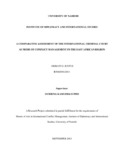| dc.contributor.author | Ombati, O Justus | |
| dc.date.accessioned | 2013-11-13T12:52:35Z | |
| dc.date.available | 2013-11-13T12:52:35Z | |
| dc.date.issued | 2013-09 | |
| dc.identifier.citation | Degree Of Masters Of Arts In International Conflict Management | en |
| dc.identifier.uri | http://erepository.uonbi.ac.ke:8080/xmlui/handle/123456789/58959 | |
| dc.description | A Research Project submitted in partial fulfillment for the requirements of
Master of Arts in International Conflict Management, Institute of Diplomacy and International
Studies, University of Nairobi | en |
| dc.description.abstract | Conflicts have been permanent feature in the East African region despite the spirited efforts by
the respective Governments to deal with them. Such conflicts lead to massive destruction of
property, deaths and breakdown of infrastructure. Conflicts in East Africa are often assumed to
have a state a sponsored perspective and thus since the state is the creator of the National Legal
Institutions, it apparently becomes difficulty to have state officers and Heads of
governments/state to be tried by the same institutions that they created. The International
Criminal Court aims at assisting the National Jurisdiction of respective nation-state that have
failed to offer justice to the victims. Indeed the feelings of the affected communities are that the
International Criminal court is a panacea to the failure of the National courts that have
persistently denied the victims justice. The emergence of the International Criminal Court thus
changed the perception of the victims who from far see the light at the end of the tunnel. The
study carries out a comparative analysis of the International Criminal Court as a mode of conflict
management in East Africa region. The study seeks to assess how the intervention of the
International Criminal Court in the region has either reduced or increased conflict. To achieve
this objective, the study examines and compares the reaction of the people of East Africa region
on how the International Criminal Court has led to conflict management in East Africa. The
Study will be undertaken using both the Qualitative and Quantitative research methods with the
sample person chosen across East Africa. The study seeks to test the following hypothesis: The
International criminal court does not have any effect on the conflict management in the East
African region, the International criminal court is a mode of conflict management in the East
Africa region and that the International criminal Court is not a mode of conflict management in
the East Africa.
vi
Finally, having evaluated the objectives of the study of the ICC, its role in the conflict
management the study zeroed in and sought to find out whether it has helped to reduce conflict
within the East Africa Region. This is one of the reasons as to why leaders in the political realm
both cling to power and continue unleasing terror to the citizens and bar the international
community from intervening. Due to notion of safeguarding the National sovereignty and the
clause of complementarily it gives the persons behind the attacks a chance to protection in
disguise that the national interest comes first. Additionally, owing to the fact that the
International Court does not have a police of its own it depends on those governments that it is
investigating thus it becomes a big problem when the inductees are the state officers. This has
been largely due to the weak political institutions, legislative and constitutional offices like
electoral bodies and the Judiciary. There has been a concern by the relevant bodies and the
International community to come up with measures so as to prevent or rather mitigate such
occurrences of conflict where they lead to civil war like the Rwanda 1994 where there is
systemic killing of civilians by either the Government officials or fellow neighbours. Failure by
the respective National institutions to either investigate and prosecute the perpetrators of the said
violence led to the invitation of the International criminal Court to investigate and prosecute the
persons behind the conflicts in Northern Uganda and the violence that broke out in Kenya
following the disputed 2007/2008 post-election violence where the Government of Kenya failed
to institute a special tribunal to prosecute the persons behind the violence. Consequently, a
warrant of arrest has been issued against the top leadership of the LRA by the International
Criminal Court and also three Kenyans are facing trial before the International Criminal Court. It
is thus due to the involvement of the ICC in the region that this research will seek to find out
whether it will serve as a mode of conflict management in the region. | en |
| dc.language.iso | en | en |
| dc.publisher | University of Nairobi | en |
| dc.title | A comparative assessment of the international criminal court as mode of conflict management in the east African region | en |
| dc.type | Thesis | en |
| local.publisher | Institute of Diplomacy and International Studies | en |

